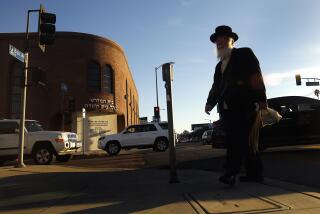‘December Dilemma’ Draws Attention to Hanukkah : Festival: The holiday grows in importance in the United States because it allows Jews to express their faith in response to images of Christmas. In Israel, it is a minor observance.
NEW YORK — Controversies over the placing of Hanukkah menorahs on government property have been erupting with more frequency each December, along with larger displays of Hanukkah cards in stores, and billboards and posters urging even secular Jews to “light the candles.”
Despite all this attention, the Festival of Lights, which begins Sunday this year, is actually a minor observance on the Jewish calendar and one that doesn’t get as much attention in Israel as it does in the United States.
“In America, Hanukkah has become almost the most widely observed Jewish holiday,” said Steven Bayme, director of Jewish communal affairs for the American Jewish Committee. “Only Passover Seders score as highly as Hanukkah, and Passover is a major holiday.”
Some American Jews view the growing importance of the festival in the United States as a response to the “December dilemma,” in that Jews are unable to join in religious celebrations of Christmas and are unsure whether to use the secular elements such as Christmas trees and Santa Claus, which are unavoidable whether one lives in a large city or small town.
In her recently published collection of autobiographical essays, Jewish feminist Letty Cottin Pogrebin says that as a child she never envied her Christian friends at this time of year. In fact, she recalls feeling sorry for her Irish-Catholic friend Sue, whose “holiday was over in 24 hours while mine lasted for eight glorious days.”
Bayme says the usual explanation for the emphasis on Hanukkah in the United States is that the festival is a time to demonstrate how American and Jewish values are compatible. “Hanukkah has become a time of year when American Jews feel comfortable with their Americanism,” he said.
As a commemoration of the Jewish revolt against the Syrians in 165 BC and the rededication of the Temple, Hanukkah (which means “dedication”) has obvious nationalist elements, and it recalls the miracle of the cruse of oil which burned for eight days instead of one.
“For the secular Israeli public, the message of Hanukkah is, this is the time when Jews fought to regain the Jewish state,” Bayme said. “By recalling the Hanukkah event, what the Jews of Israel are doing is saying there was a time deep in the past when Jews fought for the independence of a Jewish state.”
“In Israel, it’s primarily a nationalist holiday,” said Abraham H. Foxman, national director of the Anti-Defamation League of B’nai B’rith. “It is not primarily a religious holiday but is one of Jewish history which is tied in with religion.”
In the United States, Foxman said, “it’s taken on a life of its own because of its proximity to Christmas and because of a need by some to celebrate during that period. There are 12 days of Christmas, there are eight days of Hanukkah, and there are gifts in both. It is bigger than life here because America goes into a holiday period at that time.”
Marc Stern, co-director of the American Jewish Congress’ commission on law and social action, says that Hanukkah is “something of a bigger deal” today than it was when he was growing up in the 1950s. “That’s in part because of the greater openness of the society and also because televison and the media have played a greater influence” in emphasizing the festival, he said.
Stern is somewhat bemused by all this, because “Hanukkah is a minor holiday in the Jewish tradition. Major holidays are all marked by abstinence from work, and that’s not true of Hanukkah.”
Bayme of the American Jewish Committee commented that “in the very secular societies of Israel and America, if anything, we’ve infused Hanukkah with more religious values rather than less.” In that respect, he said, “it’s just the opposite” of what has happened with Christmas.
More to Read
Sign up for Essential California
The most important California stories and recommendations in your inbox every morning.
You may occasionally receive promotional content from the Los Angeles Times.










